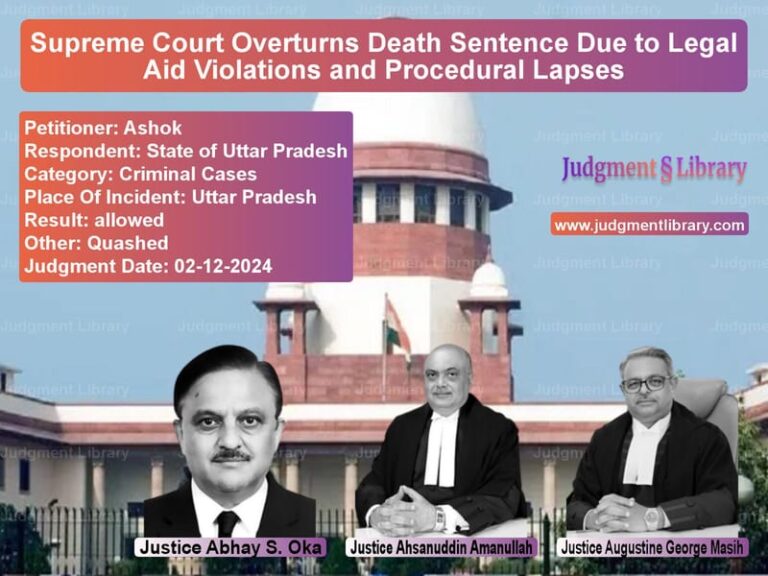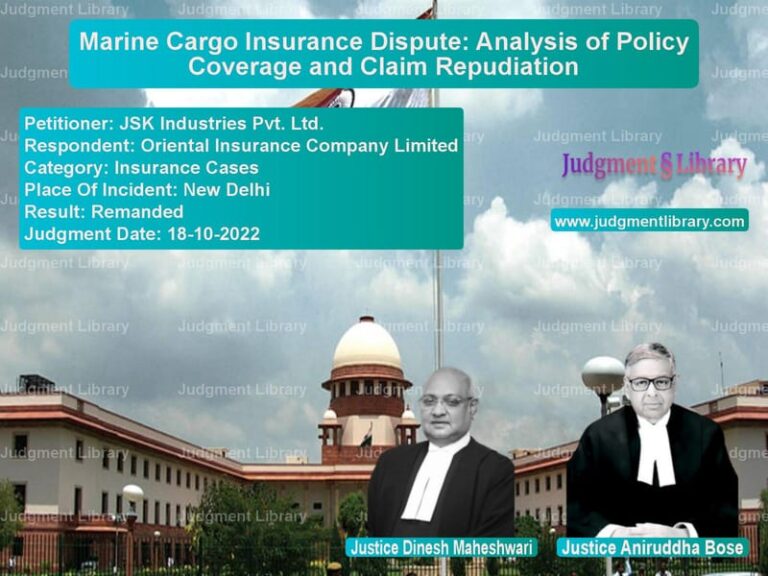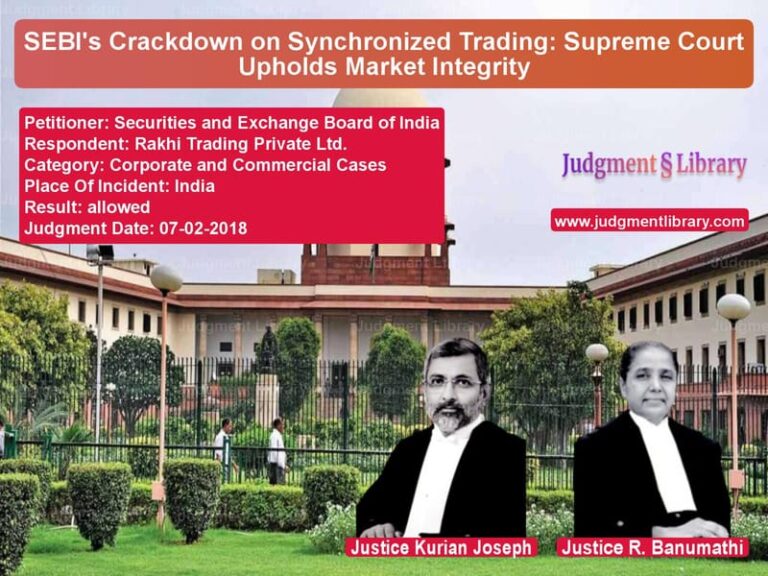Supreme Court Quashes Charges in Public Servant Obstruction Case for Lack of Legal Process
The Supreme Court of India, in its recent judgment in B.N. John vs. State of Uttar Pradesh, addressed a critical issue concerning the legality of cognizance taken by the Chief Judicial Magistrate (CJM) in a case involving obstruction of public servants under Section 353 of the Indian Penal Code (IPC). The appellant challenged the proceedings, alleging that the cognizance was taken without adhering to the procedural requirements stipulated in the law, including the failure to obtain a written complaint from a public servant, as required under Section 195(1) of the Criminal Procedure Code (CrPC). The Supreme Court quashed the criminal proceedings, setting a significant precedent regarding the due process in criminal cases.
Background of the Case
The dispute arose from an incident on June 3, 2015, when an FIR (No. 290/2015) was registered under Sections 353 (Assault or criminal force to deter public servant from discharge of duty) and 186 (Obstructing a public servant in the discharge of their duty) of the IPC. The appellant, B.N. John, was accused of obstructing officials who were conducting a raid at a hostel run by the Sampoorna Development Trust, alleging that the hostel was operating without proper authorization under the Juvenile Justice (Care and Protection of Children) Act, 2015. The appellant denied the allegations, claiming that the raid was conducted arbitrarily and that the charges were politically motivated.
Following the registration of the FIR, the appellant was arrested but granted bail the same day. The charge-sheet was filed in June 2015, and cognizance was taken by the CJM on August 11, 2015, which led to the issuance of summons against the appellant. The appellant then filed a petition before the Allahabad High Court under Section 482 of the CrPC, seeking to quash the charges, but the High Court dismissed the plea, leading to the present appeal before the Supreme Court.
Read also: https://judgmentlibrary.com/supreme-court-orders-fresh-consideration-of-bail-in-mcoca-murder-case/
Petitioner’s Arguments
The petitioner, represented by Advocate A. Kumar, made several key arguments:
- Under Section 195(1)(a) of the CrPC, no cognizance can be taken under Section 186 IPC unless a written complaint is filed by the public servant concerned. However, no such complaint was filed in this case, thus rendering the proceedings illegal.
- There was no allegation of physical assault or use of criminal force to deter the public servants from performing their duties, which is a prerequisite for invoking Section 353 IPC.
- The charge-sheet was filed under Section 353 IPC, but the facts narrated in the FIR do not constitute an offense under this section, which specifically requires criminal force or assault, neither of which were mentioned in the FIR.
- The High Court had erred by not considering the legal requirements for taking cognizance of the case and had failed to quash the proceedings based on these discrepancies.
Respondent’s Arguments
The respondent, represented by Advocate R. Patel, countered the petitioner’s arguments by asserting the following:
- The appellant’s actions of obstructing the public servants were sufficient to constitute an offense under Section 186 IPC, which deals with obstruction of public servants in the discharge of their duties.
- The High Court’s decision was correct, as it had applied the relevant provisions of law and did not find any reason to quash the charge-sheet.
- The failure to file a written complaint under Section 195(1) of the CrPC could be considered a minor procedural lapse, which did not invalidate the entire case, especially when there was sufficient prima facie evidence against the appellant.
Supreme Court’s Observations
The Supreme Court Bench, comprising Justices B.V. Nagarathna and Nongmeikapam Kotiswar Singh, examined the legal points raised and made the following observations:
Legal Bar Under Section 195(1) of CrPC
“Section 195(1)(a) of the CrPC mandates that no court shall take cognizance of an offense punishable under Section 186 IPC unless a written complaint is made by the public servant concerned. This requirement is mandatory and must be complied with before the court can proceed with the case.”
Read also: https://judgmentlibrary.com/supreme-court-ruling-on-proclaimed-offender-status-and-section-174a-ipc/
Absence of Written Complaint
“In the present case, the FIR was filed based on the complaint of the District Probation Officer, who is not a public servant as defined under Section 195 of the CrPC. Moreover, no written complaint was submitted by the public servants involved in the raid, which is a fundamental flaw in the legal process.”
Inapplicability of Section 353 IPC
“Section 353 IPC clearly requires an act of assault or use of criminal force to deter a public servant from discharging their duty. The FIR and statements recorded during the investigation only mention obstruction, which does not meet the legal threshold for invoking Section 353 IPC.”
Criminal Procedure Code (CrPC) Provisions
The Court examined the provisions of the CrPC related to non-cognizable offenses:
“Section 155 of the CrPC governs the investigation of non-cognizable offenses. In this case, the police should have obtained prior permission from a Magistrate before investigating the matter. Since the investigation was conducted without the necessary authorization, the proceedings against the appellant are vitiated.”
Final Judgment
The Supreme Court ruled in favor of the appellant, quashing the charges and setting aside the orders passed by the High Court and the CJM, Varanasi. The Court made the following decisions:
- The FIR registered under Sections 353 and 186 IPC was quashed.
- The charge-sheet filed in the case was set aside, as the legal requirements for taking cognizance under Section 195(1) of the CrPC were not fulfilled.
- The proceedings before the CJM, Varanasi, including the issuance of summons and further orders, were declared invalid.
Impact of the Judgment
This ruling has significant implications for criminal proceedings related to public servants and the proper legal procedures that must be followed. The key impacts of the judgment are:
- The mandatory requirement for a written complaint by a public servant under Section 195(1) of the CrPC must be strictly followed before any cognizance can be taken under Section 186 IPC.
- The Court emphasized the need for proper investigation authorization in cases involving non-cognizable offenses, ensuring that procedural safeguards are maintained.
- The ruling highlights the importance of adhering to legal standards in FIR registration and investigation, ensuring that criminal proceedings are initiated based on sound legal grounds.
Conclusion
The case of B.N. John vs. State of Uttar Pradesh reinforces the need for strict adherence to procedural requirements in criminal cases, particularly in cases involving public servants. By quashing the proceedings and emphasizing the necessity of a written complaint and proper investigation authorization, the Supreme Court has safeguarded the legal process from misuse and ensured that criminal justice is dispensed fairly and lawfully.
Petitioner Name: B.N. John.Respondent Name: State of Uttar Pradesh.Judgment By: Justice B.V. Nagarathna, Justice Nongmeikapam Kotiswar Singh.Place Of Incident: Varanasi, Uttar Pradesh.Judgment Date: 02-01-2025.
Don’t miss out on the full details! Download the complete judgment in PDF format below and gain valuable insights instantly!
Download Judgment: b.n.-john-vs-state-of-uttar-prade-supreme-court-of-india-judgment-dated-02-01-2025.pdf
Directly Download Judgment: Directly download this Judgment
See all petitions in Bail and Anticipatory Bail
See all petitions in Fraud and Forgery
See all petitions in Extortion and Blackmail
See all petitions in Theft and Robbery Cases
See all petitions in Custodial Deaths and Police Misconduct
See all petitions in Judgment by B.V. Nagarathna
See all petitions in Judgment by N. Kotiswar Singh
See all petitions in allowed
See all petitions in Quashed
See all petitions in supreme court of India judgments January 2025
See all petitions in 2025 judgments
See all posts in Criminal Cases Category
See all allowed petitions in Criminal Cases Category
See all Dismissed petitions in Criminal Cases Category
See all partially allowed petitions in Criminal Cases Category







